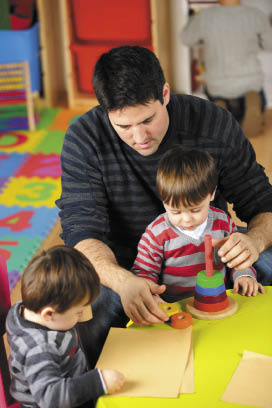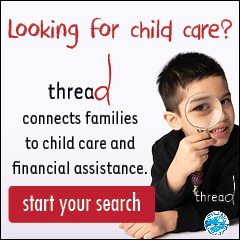
Kindergarten: Ready or Not?
Story by Sarah Gonzales
It’s a huge day for moms, dads and little ones; a day that marks a new phase in a child’s life as they begin to venture outside their home, completely independent of their parents. It’s the first day of kindergarten.
Why Being Ready Matters
Kindergarten is one of the first steps to becoming a successful adult, says Abbe Hensley, executive director of Best Beginnings, a statewide partnership that works to ensure that children are prepared to succeed. “We know that if children start school behind that they are likely to stay behind,” she says. “We want kids to move through school at the right pace so that they are proficient in reading in third grade, they graduate on time, then go on to a job, or more schooling.”
The first few years of a child’s life sees more brain growth than any other time. “What happens during early childhood development significantly impacts us for life,” says Stephanie Berglund, CEO of thread, a non-profit organization that connects caregivers to early care and education resources for pre-kindergarten aged children. “A child’s readiness for school is a powerful determinant of how he or she will fare in life.”
Brain development is serious stuff, but it doesn’t mean that helping baby learn isn’t a lot of fun! Berglund and Hensley both stress that playing, reading, speaking, dancing and singing are the best ways that caregivers can help little ones develop and grow.
So, What Does Readiness Look Like?
Kids who are well prepared to succeed in kindergarten will score well in these five main areas of development as outlined by the Alaska Department of Education and Early Development.
1. Physical well-being, health and motor development: the child moves their body well and demonstrates strength and coordination.
2. Social and emotional development: the child does well in groups, is able to control their impulses.
3. Approaches to learning: the child is curious, asks questions and pays attention to lessons.
4. Cognition and general knowledge: the child demonstrates knowledge of counting and numbers, and can sort objects.
5. Communication language and literacy: the child demonstrates knowledge of sounds, letters and symbols.
Kindergarteners are not expected to be able to read, but they should recognize the relationships between sounds and concepts, and also words and the contexts in which they are used. This is early literacy.
“Being literate is the basis for so many things,” Hensley says, referring to studies that have shown children who hail from a “rich language environment” are likely to do better throughout their entire school careers. Caregivers create this environment by talking in the car while running errands, narrating the grocery shopping trip, or just lying face-to-face telling baby about their day.
A Healthy Home Environment
A safe and supportive home environment, regular well-child check ups and exercise through play and healthy nutrition are all key to a child’s physical, mental and emotional health – starting from birth.
Berglund says that so much of ensuring kindergarten success has to do with social and emotional factors – controlling the impulse to hit or act out, sharing with others – things primarily learned in a nurturing home environment. Kids who do best “arrive healthy, socially and emotionally prepared for school and have strong and stable family supports,” she says. “This includes access to medical care, immunizations and consistent well-child checks to ensure developmental milestones.”
Meeting the Milestones
The State’s Early Intervention/Infant Learning Program website details developmental milestones from birth to age three. From picking up small objects at 12-15 months to making choices and walking backward at 24-27 months, to hopping on one foot and pouring water into a cup at 33-36 months, the checklist also offers age-appropriate learning activities parents or caregivers can do with kids.
Program manager Erin Kinavey says that the Early Intervention/Infant Learning Program can assist families whose children might fall behind these milestones by connecting them with professional resources, from speech therapists to work on sounds, to occupational therapists to assist with “sensory integration.”
“When you are looking at young kids, sensory issues are important,” explains Kinavey, explaining that knowing how to self-soothe is an important part of preparing for kindergarten. “You can imagine that if a child is really sensitive to lots of sound, and then they’re in a classroom with 30 kids, they’re going to have a hard time paying attention,” or they may act out. Occupational therapy helps with this, but so can simple strategies like squeezing a stress ball or cuddling with a blanket. These are ways that “caregivers can start empowering their child to know when they’re feeling stressed and how to calm themselves down,” she says.
All I Really Need to Know I Learned in Kindergarten…
Ultimately, kindergarten preparedness comes down to two motivating factors: love and economics. “We all want our children to be successful grownups - adults who are curious and interested in things, who contribute to their communities, and who are productive citizens,” says Hensley. It may seem like a long time until your little one is grown up and gainfully employed, but it’s never too early to help them get started on the road to success.









